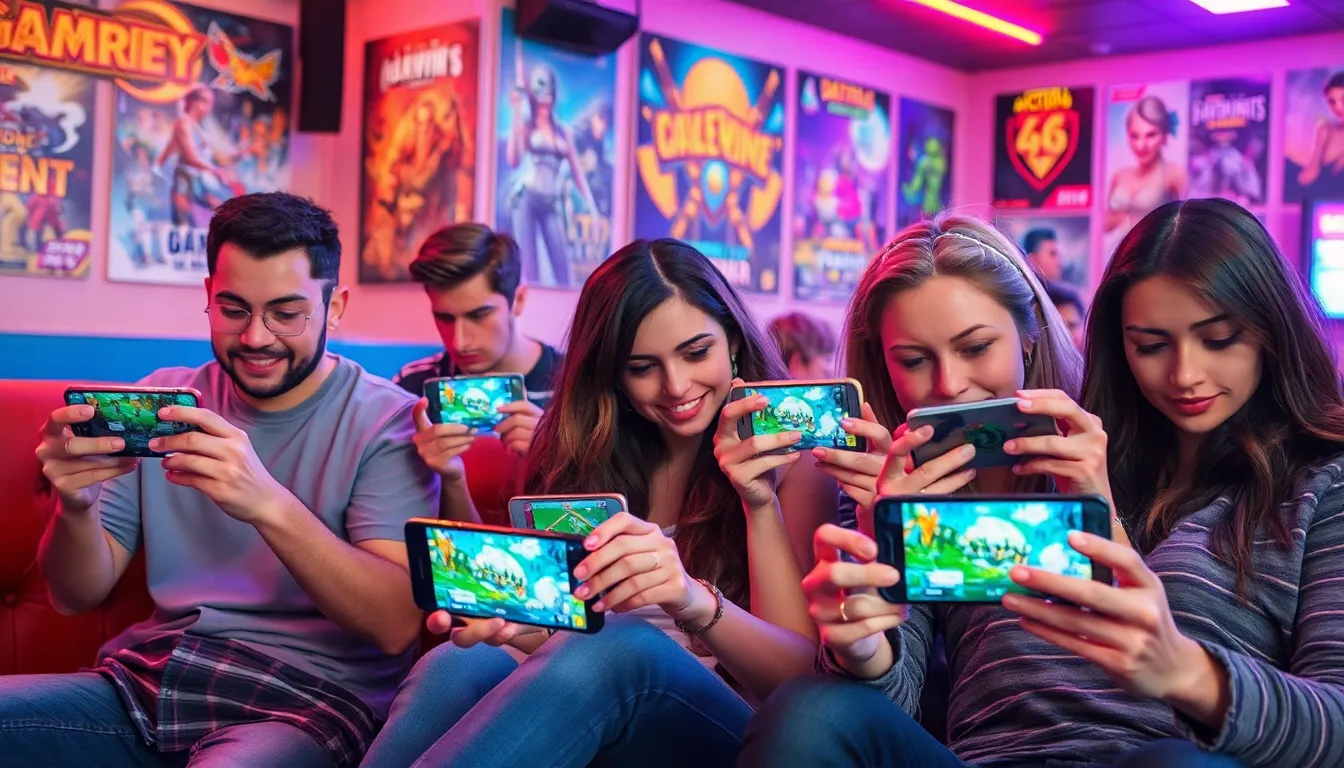In a world where boredom lurks around every corner, mobile game apps have swooped in like superheroes, ready to save the day. With just a tap, players can dive into thrilling adventures, solve mind-bending puzzles, or even build their own empires—all from the palm of their hand. Who needs a gym membership when you can flex those thumb muscles instead?
Table of Contents
ToggleOverview of Mobile Game Apps
Mobile game apps revolutionized entertainment by offering engaging experiences on handheld devices. The variety of genres includes action, adventure, puzzles, and simulations, catering to diverse user preferences. Many popular titles, such as Candy Crush Saga and PUBG Mobile, showcase the potential for captivating gameplay and community interaction.
Popularity surged as smartphones became ubiquitous. As of 2023, mobile gaming generated over $175 billion in revenue worldwide, surpassing other gaming platforms. This growth reflects the accessibility and convenience of gaming on the go. Users can enjoy seamless gameplay at home, during commutes, or while waiting.
Development of mobile game apps emphasizes user engagement. Features like regular updates, seasonal events, and social connectivity enhance experiences. Gamers often engage in competitions or collaborate with friends, fostering a sense of community within applications.
Monetization strategies also contribute to success. Many mobile games adopt free-to-play models, offering in-app purchases for enhanced experiences. This approach attracts a larger audience while generating revenue.
Adding to the appeal, mobile game apps leverage technology advancements. High-quality graphics, augmented reality, and immersive soundtracks elevate gameplay quality. As technology advances, experiences become increasingly interactive and lifelike.
Overall, mobile game apps provide a unique blend of entertainment and interactivity. Targeting busy lifestyles, these applications seize the opportunity to entertain and engage users at any moment. With continuous innovations, the future of mobile gaming looks promising.
Popular Genres of Mobile Game Apps

Mobile game apps encompass various genres that cater to different interests and demographics. Two of the most popular genres include action and adventure, as well as puzzle and strategy games.
Action and Adventure
Action and adventure games dominate the mobile gaming landscape. They offer immersive experiences filled with excitement and exploration. Titles such as PUBG Mobile and Fortnite provide thrilling combat scenarios and engaging storylines. Players navigate vibrant worlds, overcoming obstacles and defeating enemies. These games frequently feature multiplayer modes, enabling players to collaborate or compete with friends and global opponents. Graphical enhancements elevate the experience, making these adventures visually stunning and engaging. Generally, this genre attracts gamers looking for adrenaline-fueled challenges and epic quests.
Puzzle and Strategy
Puzzle and strategy games appeal to those who enjoy critical thinking and problem-solving. They often challenge players to devise plans or solutions while providing mental stimulation. Candy Crush Saga remains a quintessential example, inviting gamers to match colorful candies and complete levels. Players frequently engage with friend leaderboards to add a competitive edge. Many titles incorporate elements of resource management, encouraging strategic thinking and careful planning. Players benefit from regular updates, introducing new puzzles and challenges to maintain interest. Overall, this genre captivates a wide audience with diverse gameplay options and engaging mechanics.
Key Features of Successful Mobile Game Apps
Successful mobile game apps feature distinct elements that enhance their appeal. Developers focus on creating engaging user interfaces and experiences that facilitate seamless navigation. Simple layouts and intuitive controls ensure players can easily access gameplay without frustration. High-quality visuals and responsive design merit significant attention, contributing to overall satisfaction.
Innovative monetization strategies play a crucial role in profitability. Free-to-play models entice a broader audience and provide accessibility. Players appreciate in-app purchases that offer enhancements while maintaining game balance. Limited-time events and exclusive items generate excitement, driving additional spending. Advertising partnerships can also yield substantial revenue, particularly when integrated smoothly into the gaming experience. Balancing monetization with user satisfaction ultimately leads to long-lasting success in mobile game apps.
The Impact of Mobile Game Apps on Gaming Culture
Mobile game apps significantly alter gaming culture by expanding accessibility and diversity in gaming experiences. Players engage with various genres, which include action, adventure, puzzles, and simulations. Titles such as Candy Crush Saga and PUBG Mobile illustrate how these apps attract different audiences while fostering a sense of community.
Growing engagement occurs through features like regular updates and seasonal events. Developers create opportunities for social interaction, allowing players to connect and collaborate. This community aspect enhances the gaming culture, making mobile games a social experience rather than just a solitary activity.
Revenue figures highlight the impact mobile games have on the overall gaming industry. In 2023, mobile gaming revenue surpassed $175 billion worldwide, establishing itself as a leading entertainment force. The convenience and immediacy of mobile gameplay appeal to users who prefer gaming on the go, further ingraining mobile apps into contemporary culture.
Technology advancements bolster this impact. Improved graphics and augmented reality make mobile games more immersive and interactive. Players experience lifelike environments encouraging deeper emotional connections and extended play sessions.
Successful mobile game apps emphasize user-friendly interfaces and navigation. Developers focus on intuitive controls, which enhance overall player satisfaction. Furthermore, innovative monetization strategies attract larger audiences while maintaining engagement. Balance between monetization tactics and user experience is crucial for the longevity of these games.
Mobile game apps shape modern gaming culture through accessibility, community interaction, and technological innovation. These elements create a rich and evolving landscape that appeals to a diverse player base.
Future Trends in Mobile Game Apps
Augmented reality (AR) integration will further expand in mobile gaming. Titles like Pokémon GO already showcase the potential for blending virtual elements with real-world environments, creating immersive experiences. Gamers are increasingly drawn to AR, enhancing engagement levels.
Artificial intelligence (AI) will play a key role in personalizing gameplay. Enhanced algorithms can analyze player behavior, offering tailored content and challenges that keep users invested. This focus on personalized experiences can retain players longer.
5G technology is set to revolutionize mobile gaming. With faster download speeds and lower latency, developers can create more complex games with richer graphics. This technological leap supports seamless online multiplayer experiences, further appealing to competitive gamers.
Cross-platform compatibility emerges as a major trend. Players desire the flexibility to switch between devices while maintaining their progress. Games that allow this kind of connectivity will likely see higher retention rates and a growing user base.
Focus on community-driven content becomes essential. Players enjoy sharing experiences and collaborating on projects within games. Incorporating features that encourage social interaction can foster loyalty and boost user satisfaction.
Blockchain technology may introduce new monetization strategies, enabling secure transactions and unique digital ownership. The potential for players to earn from in-game assets could appeal to gamers seeking additional value from their experiences.
Finally, sustainability initiatives in game development are gaining traction. Developers are becoming aware of their environmental impact. Utilizing eco-friendly practices can enhance brand reputation and resonate with socially conscious consumers.
Together, these trends point towards an exciting future for mobile game apps, ensuring they remain at the forefront of entertainment and technology innovation.
Mobile game apps have transformed the entertainment landscape by offering engaging and accessible experiences. As players continue to seek fun and interactive ways to pass the time these apps cater to diverse interests and skill levels. The combination of innovative gameplay monetization strategies and community engagement ensures their sustained popularity.
Looking forward the future of mobile gaming is bright with advancements like augmented reality and artificial intelligence promising to enhance user experiences further. By embracing these trends developers can continue to captivate audiences and solidify mobile gaming’s position as a dominant force in the entertainment industry.




